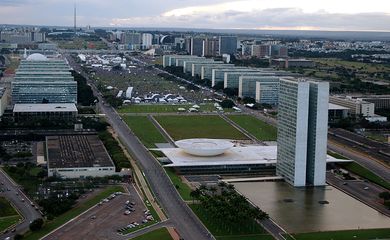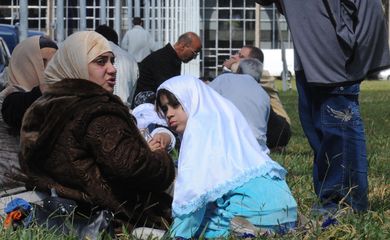Number of asylum applications in Brazil has grown 2,000%, UN says


The current worldwide refugee population is larger than the number of displaced persons from the Second World War

The number of asylum applications in Brazil has risen more than 2,000% in four years, but the country has hardly changed to accommodate this demand, the representative of the United Nations High Commissioner for Refugees (UNHCR), Andrés Ramires, said Monday (June 15). He made this remark during a seminar on jobs and refugees' rights in Brazil, held in Rio de Janeiro.

Andrés Ramires, UNHCR representative
The event, which was part of the World Refugee Day (June 20) commemorations, included the pre-release of an information booklet for refugee and asylum-seeking workers to be published in Portuguese, English and French in the coming months.
“In 2010, (Brazil) received about 560 (asylum) applications. By the end of 2014, the number of applications was 12,000. This is a global trend, but in Brazil the numbers have grown more than elsewhere in the world in percentage terms,” Ramires said. He pointed out that the refugees in the world today have outnumbered Second World War displacements.
According to the UN official, Brazil's main challenge in meeting this growing demand is to make the National Committee for Refugees (CONARE) more robust – the agency remains almost the same since its creation. “It needs to be expanded to handle the large number of refugees coming to the country,” he said.
CONARE is a collegial body composed of representatives from the Ministries of Justice (chair), Foreign Affairs (deputy chair); Labor and Employment; Health; and Education. Other members include representatives from the Federal Police; Caritas Archdiocese NGOs (devoted to assisting refugees in the country); and the UNHCR as a non-voting member.
CONARE expects the number of refugees in Brazil to reach 17,000 this year. The main groups according to agency come from Syria, Colombia, Angola, and the Democratic Republic of Congo. There are also other immigrants who are not counted as refugees, including Haitians and South Americans.
In October 2014, 7,289 refugees from 81 different nationalities, including resettled refugees, were reported by CONARE to be in Brazil.
Andrés Ramires commended Brazilian law for including refugees in nearly all public policies, but regretted that many experience difficulties accessing rights in practice. One example is the Welfare Benefit for the Elderly and Disabled (BPC), which could provide a welcome assistance, but refugees are not eligible to receive the benefit. It provides a minimum monthly wage to people aged 65 or more and people with disabilities.
Brazilian law entitles asylum-seekers in the country to issue an employment ID (CTPS), but the agencies and organizations who work with this population say most of them face difficulties getting a job because of discrimination, language or legal barriers.
Charlly Kongo, a 35-year-old man from Congo, for example, arrived in Brazil seven years ago as a war refugee. He holds a nursery degree from his home country, but has not succeeded in validating his diploma in Brazil. It took him two years to get a job as a hotel cleaner. A major challenge in his adaptation to his new home was discrimination.
“Discrimination is widespread, especially against us black Africans. People take us for drug dealers, uneducated, uncultivated people. We face this discrimination on a daily basis. Another difficulty is learning the language, I'd never spoken Portuguese before,” he said. He speaks French and Lingala as native languages.
Brazilian law defines a refugee as someone who flees their country because of persecution, whether based on race, religion, national identity, social group, or political opinion – or in case of verified serious and widespread human rights violations.
The UN Convention on Refugees, ratified by 147 countries including Brazil, requires governments to ensure the right to safe and legal work for these people. In addition, refugees are entitled to use Brazil's public service system, including the national healthcare system (SUS), one of the world's largest government-run healthcare systems.
Translated by Mayra Borges
Fonte: Number of asylum applications in Brazil has grown 2,000%, UN says




